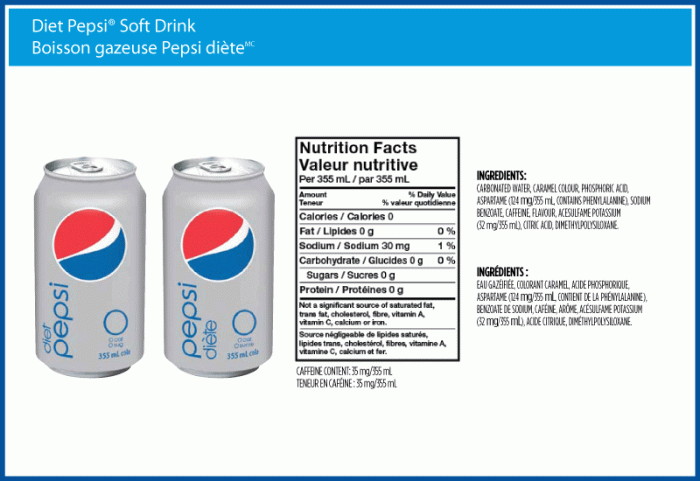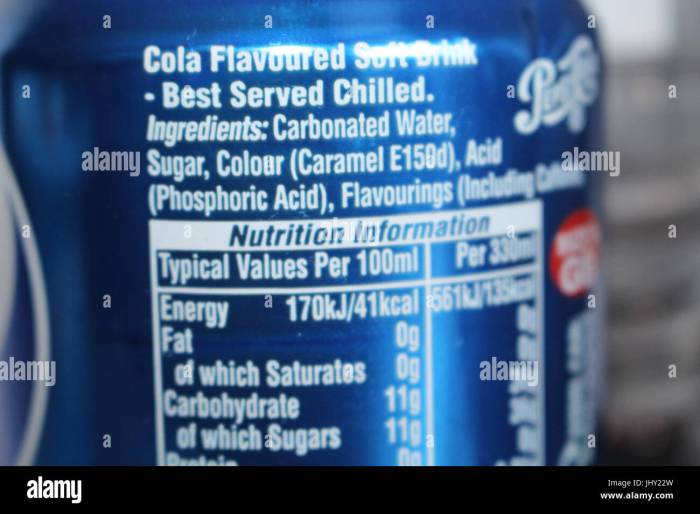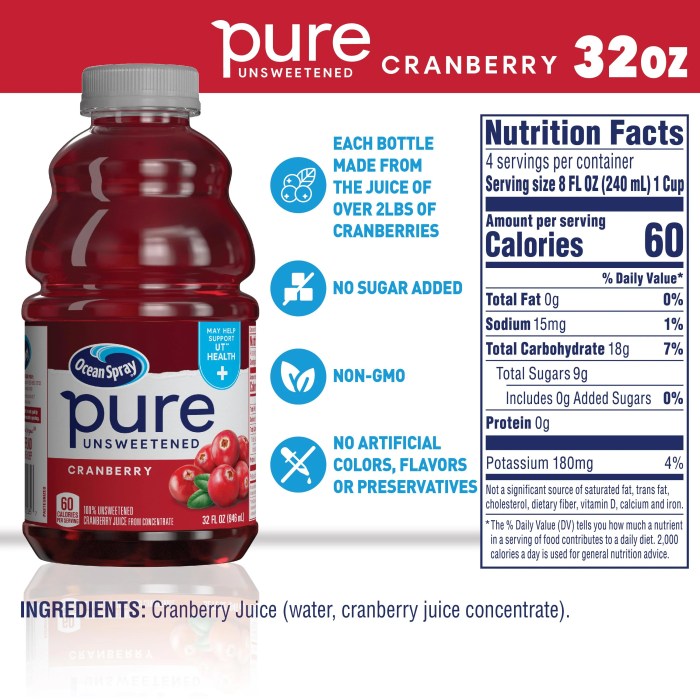Nutritional Content Overview: Can Of Pepsi Nutrition Facts

Can of pepsi nutrition facts – Pepsi, like most carbonated soft drinks, is primarily composed of sugar, water, and carbonation. Understanding its nutritional profile is crucial for making informed choices about consumption. This section provides a detailed breakdown of the nutritional information typically found on a can of Pepsi, along with comparisons to other similar beverages and variations across different can sizes.
Understanding a can of Pepsi’s nutrition facts is crucial for mindful consumption. Comparing this to other sugary drinks, like checking out the small frosty nutrition facts , helps illustrate the varying sugar and calorie content. Ultimately, knowing the nutritional breakdown of Pepsi allows for better informed choices regarding your daily intake.
Nutritional Information per Serving (12 oz Can)
The following table presents a typical nutritional breakdown for a 12-ounce can of Pepsi. Note that slight variations may occur depending on the manufacturing batch and specific product formulation.
| Nutrient | Amount per Serving | % Daily Value | Unit of Measurement |
|---|---|---|---|
| Calories | 150 | 7 | kcal |
| Total Fat | 0 | 0 | g |
| Saturated Fat | 0 | 0 | g |
| Cholesterol | 0 | 0 | mg |
| Sodium | 25 | 1 | mg |
| Total Carbohydrate | 39 | 13 | g |
| Sugars | 39 | N/A | g |
| Protein | 0 | 0 | g |
| Caffeine | 34 | N/A | mg |
Nutritional Content Across Different Sizes
The nutritional content of Pepsi scales proportionally with the serving size. Larger servings contain more calories, sugar, and caffeine.
- A 20-ounce bottle of Pepsi will contain approximately 250 calories and 52 grams of sugar, roughly 1.67 times the amount found in a 12-ounce can.
- Smaller sizes, such as mini-cans, will have proportionally less of each nutrient.
Comparison with Other Carbonated Soft Drinks
Pepsi’s nutritional profile is relatively similar to other cola-type soft drinks. However, variations exist in sugar, calorie, and caffeine content.
| Drink Name | Sugar Content (grams) (12 oz) | Calories (12 oz) | Caffeine Content (mg) (12 oz) |
|---|---|---|---|
| Pepsi | 39 | 150 | 34 |
| Coca-Cola | 39 | 140 | 34 |
| Dr. Pepper | 41 | 150 | 41 |
| 7 Up | 39 | 140 | 0 |
Sugar and Sweeteners

Let’s dive into the sweet stuff – or rather, the sugary stuff – that makes Pepsi so, well, Pepsi. We’re talking about the sugars and sweeteners that contribute to its distinctive taste, but also raise some important health considerations. Understanding the sugar content is key to making informed choices about your beverage consumption.The primary sweetener in regular Pepsi is sugar, specifically sucrose.
A 12-ounce can typically contains around 39 grams of sugar, which is equivalent to about 10 teaspoons. This high sugar content is a significant factor contributing to the drink’s overall caloric value and potential health implications. It’s important to remember that added sugars like sucrose are not essential nutrients and provide empty calories, meaning they lack significant nutritional value beyond their sweetness.
Sugar Content and Health Implications
Consuming large amounts of added sugar, such as that found in regular Pepsi, is linked to several health problems. High sugar intake is associated with weight gain, type 2 diabetes, heart disease, and tooth decay. The excess sugar contributes to increased calorie intake, potentially leading to obesity, and it can disrupt insulin regulation, increasing the risk of diabetes.
The high sugar concentration also provides a breeding ground for bacteria in the mouth, contributing to dental caries. Moderation is key, and relying on sugary drinks as a primary source of hydration and calories is generally discouraged by health professionals.
Comparison of Sugar Content Across Pepsi Variants, Can of pepsi nutrition facts
The sugar content varies significantly across different Pepsi formulations. Understanding these differences allows consumers to make more informed choices based on their individual health goals and preferences.
- Regular Pepsi: As discussed, contains approximately 39 grams of sugar per 12-ounce can.
- Diet Pepsi: Contains negligible amounts of sugar. Sweetness is achieved through artificial sweeteners such as aspartame or sucralose.
- Pepsi Zero Sugar: Similar to Diet Pepsi, this version contains negligible amounts of sugar and relies on artificial sweeteners for sweetness.
While diet and zero-sugar versions offer a lower-sugar alternative, it’s crucial to note that the long-term health effects of artificial sweeteners are still under investigation and remain a subject of ongoing debate within the scientific community. Some studies have suggested potential links between artificial sweeteners and certain health issues, although the evidence is not conclusive.
Answers to Common Questions
What are the differences in nutritional content between regular Pepsi and Pepsi Max?
Pepsi Max, being a diet version, typically contains artificial sweeteners instead of sugar, resulting in significantly fewer calories and carbohydrates. The caffeine content is usually similar.
Does Pepsi contain any gluten?
No, Pepsi does not contain gluten and is generally considered safe for those with celiac disease or gluten sensitivity.
How much sugar is in a 2-liter bottle of Pepsi?
The exact amount varies slightly depending on the region and manufacturing process, but a 2-liter bottle of Pepsi typically contains a very high amount of sugar; check the specific nutrition label for the precise amount.
Are there any long-term health risks associated with drinking Pepsi regularly?
Regular consumption of sugary drinks like Pepsi is linked to increased risks of weight gain, type 2 diabetes, heart disease, and tooth decay. Moderation is key.








